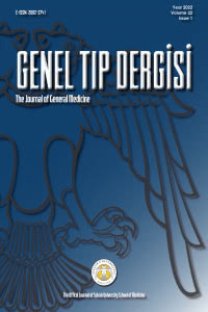Tıp fakültesi derslerinin verimliliği, işleniş şekli ve öğrencilerin devam kontrolünün değerlendirilmesi
___
Özdemir ST. Tıp eğitimi ve yetişkin öğrenmesi. Uludağ Üniversitesi Tıp Fakültesi Dergisi 2003;29:25-8.Klein J. Attention, scholastic achievement and timing of lessons. Scandinavian Journal of Educational Research 2001;45:301-9.
Kibar B, Fidan Y, Yıldıran C. Öğrencilerin zaman yönetimi becerileri ile akademik başarıları arasındaki ilişki: Karabük Üniversitesi. Business & Management Studies: An Int J 2014;2:136-53.
Benton D, Sargent J. Breakfast, blood glucose and memory. Biological Psychology 1992;33:207-10.
Özkanal Ü, Arıkan N. The relation between success and absenteeism at esogu English preparatory school. J Lang Teach Res 2011;2:68-72.
Uğurlu CT, Usta HG, Şimşek AS. Yükseköğretimde devamsızlık olgusu ve nedenlerine ilişkin öğretim üyeleri ve üniversite öğrencilerinin görüşleri. Turkish Studies 2015;10:1009-30.
Pehlivanoğlu MK, Duru N. Üniversite öğrencilerinin devamlılığının parmak izi okuyucu cihaz kullanılarak izlenmesi. Türkiye Bilişim Vakfı Bilgisayar Bilimleri ve Mühendisliği Dergisi 2015;8:9-16.
Sönmez EB, Özbek NÖ, Özbek Ö. Avuç izi ve parmak izine dayalı bir biyometrik tanıma sistemi. Akademik Bilişim’07-IX Akademik Bilişim Konferansı. Kütahya. 2007:577-82.
Akçay M, Çetinkaya HH. Kampüslerde uygulanan yeni biyometrik sistemler. Akademik Bilişim’11-XIII Akademik Bilişim Konferansı. Malatya. 2011:385-9.
Varlık A, Çorumluoğlu Ö. Dijital fotogrametri teknikleri ile kişi tanıma. Harita Teknolojileri Elektronik Dergisi 2011;3:1-24.
Aksu MB, Çivitçi A, Duy B. Yükseköğretim öğrencilerinin öğretim elemanlarının ders uygulamaları ve sınıf içi davranışlarına ilişkin görüşleri. İnönü Üniversitesi Eğitim Fakültesi Dergisi 2008;9:17-42.
Karabilgin ÖS, Şahin H. Eğitim etkinliğini değerlendirmede öğrenci geri bildiriminin kullanımı. Tıp Eğitimi Dünyası 2006;21:27-33.
Bahşi İ, Çetkin M, Orhan M et al. Evaluation of attention-motivation level, studying environment and methods of medical faculty students. Eur J Ther 2017;23:1-8.
Çetkin M, Turhan B, Bahşi İ, Kervancıoğlu P. The opinions of medicine faculty students about anatomy education. Gaziantep Med J 2016;22:82-8.
Davis ZT. Effects of time-of-day of instruction on beginning reading achievement. J Educational Res 1987;80:138-40.
Biggers JL. Body rhythms, the school day, and academic achievement. J Experiment Education 1980;49:45-7.
Wile AJ, Shouppe GA. Does time-of-day of ınstruction ımpact class achievement? Studies. Perspectives in Learning J 2011;12:21-5.
Holloway J. Giving our students the time of day: Educational leadership1999;57:87-8.
Yılmaz C, Özdil T, Tümtürk A, Tümtürk E. Celal Bayar Üniversitesi İktisadi ve İdari Bilimler Fakültesi’nde okutulan üretim yönetimi derslerinde öğrencilerin devamı ile başarı notları arasındaki ilişkinin incelenmesi. XI. Üretim Araştırmaları Sempozyumu. 2011:83-91.
Roy SS, Chadalawada J. Predictors of academic performance of medical undergraduate students of microbiology class in Kolkata. Int J Med Public Health 2014;4:392-5.
Schaffhauser, D. “U West Alabama online test takers face monitoring by software security” http://campustechnology. com/articles/2009/02/12/u-west-alabama-online-test-takers-face-monitoring-by-software-security.aspx (Erişim tarihi: 29 Haziran 2016).
Vançelik S, Önal SG, Güraksın A, Beyhun E. Üniversite öğrencilerinin beslenme bilgi ve alışkanlıkları ile ilişkili faktörler. TSK Koruyucu Hekimlik Bülteni 2007;6:242-8.
Onurlubaş E, Doğan HG, Demirkıran S. Üniversite öğrencilerinin beslenme alışkanlıkları.Gaziosmanpaşa Üniversitesi Ziraat Fak Derg 2015;32:61-9.
Jacoby ER, Cueto S, Pollitt E. When science and politics listen to each other: good prospects from a new school breakfast program in Peru. Am J Clin Nutr 1998;67:795-7.
Faydaoğlu E, Energin E, Sürücüoğlu MS. Ankara Üniversitesi Sağlık Bilimleri Fakültesinde okuyan öğrencilerin kahvaltı yapma alışkanlıklarının saptanması. Gümüşhane Üniversitesi Sağlık Bil Derg 2013;2:299-311.
- ISSN: 2602-3741
- Yayın Aralığı: Yılda 6 Sayı
- Başlangıç: 1997
- Yayıncı: SELÇUK ÜNİVERSİTESİ > TIP FAKÜLTESİ
El ayak ve ağız hastalığı: olgu sunumu
Yorgunluğa kadar yaptırılan gündüz egzersizinin element metabolizması üzerine etkisi
Orta lob sendromlu olgularda bilgisayarlı tomografi bulguları
Mesut OZGOKCE, Nuri HAVAN, Süleyman KARABACAK, Ayşe HAVAN, İlyas Dündar, Fatma DURMAZ, İbrahim ÜNEY, HANİFİ YILDIZ, Sümeyra DEMİRKOL ALAGÖZ, Harun ASLAN
İLHAN BAHŞİ, MURAT ÇETKİN, PİRAYE KERVANCIOĞLU, MUSTAFA ORHAN, Hüseyin AYAN, Semih SAYIN
Atipik yerleşimli piyoderma gangrenozum olgusu
HARUN DÜĞEROĞLU, HAVVA ERDEM, Nurten TURHAN-HAKTANIR, SEVDA ÖNDER, YASEMİN KAYA
Yaşlılıkta yaşam kalitesi değerlendirilmesi: kamu hastanesine başvuranlar örneği
YASEMİN DURDURAN, BERRİN OKKA, Şadiye ŞAFAK, NAZAN KARAOĞLU, MEHMET UYAR
CaSR gen polimorfizmin koroner arter hastaların patogenezinde rolünün araştırılması
